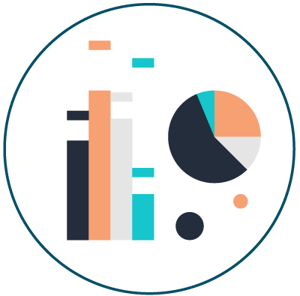https://michaeljswart.com/2011/06/meta-aggregate/
Data doesn’t have to be boring, let the numbers do the talking for you. Show your clients measurable, quantifiable results.

CAMPAIGN SET UP
KEYWORD RESEARCH
Why do it?
Keyword Research is one of the most important forms of research data to use when building a marketing campaign. Keyword research tools can help you determine a popular (profitable niche), find related markets, and rank well in search engines for specific topics to drive traffic to your site and promote your products and/or services by enhancing your marketing effectiveness. This data also helps your content marketing team understands what type of content to create and promote. http://www.fromdreamstolifestyle.com/why-keyword-research-is-so-important/
Ongoing Keyword Research…
“It’s not a one-and-done deal, but something that should be performed regularly. Keyword research is how we keep our ears to the ground, and stay in touch with your audience.” (Neil Patel - Why Keyword Research Is the Most Important Part of Digital Marketing.)
Aside from keywords, there is an abundance of other data tools to use while building a marketing campaign. Here are some of the applications available and what they can do:
-
Moz - SEO software for inbound marketing and marketing analytics
-
Answer the Public - A search query data visualisation tool that maps keyword suggestions
-
Google Keyword Planner - A keyword research tool used to find keywords that are most relevant for a business that you plan to put advertising budget towards, and in-turn drive traffic to a website or page.
-
SEMrush - SEMrush is an SEO tool that in part does keyword research, tracks and audits the keyword strategy used by competing businesses online.
-
Google Analytics - this tool is an absolute must in campaign setup and ongoing campaign success analysis. Google Analytics is a free web analytics tool used to help you analyze your website traffic, user actions, and goal tracking, to name just a few.
-
Google Search Console - A web presence monitoring tool used to optimize a website’s visibility. GC reports on metrics such as queries, pages, search appearance, devices used, and location of users.
-
TruConversion - TruConversion can be used to collect data to inform set up, and ongoing campaign optimization decisions. Some of the tracking tools within the application include: session recordings and heatmaps to assist understanding of user behavior.
Once a campaign has it’s necessary data collection applications integrated with their website, or social media pages, they will need to be monitored ongoing to identify any RED FLAGS, and optimize the campaign ongoing.

REVIEW & REPORT
How to review and what data to present to clients can make all of the difference in their perspective and understanding of the performance of the campaign. Depending on the type of client, or the goal of the project, there will be different Key Performance Indicators (KPI’s) to track and report on to clients. This is not to say that many data points will be of some importance across different campaign types, but some metrics will just mean more than others.
Don’t talk in code! Use vocabulary that your clients can understand. Presenting relevant, and specific data for each campaign is a key to communicating wins to the client.
FOR ALL CAMPAIGN TYPES
Website Engagement - Quality and Quantity of website activity
Users vs. Sessions - are people going to the site more than once, and are they visiting more than one page
Bounce and Exit rates - are people clicking on something or visiting more than one page before they LEAVE the site.
Organic Search Results - where is the client’s business ranking against other competitors in Search Engine Results Pages (SERP’s?)
Traffic Sources - where are people coming from? Whether the traffic to a business website is Direct - typed into URL address bar/organic, from a mobile phone, facebook, etc. This information can inform where to focus ad budget and campaign optimization efforts.

E-COMMERCE CAMPAIGNS
Return on Investment (ROI) Likely the most important or relevant data to an ecommerce website client will be their Return on Investment.
“How much did the client spend on the campaign, and how much did it bring in sales?”
Other metrics of value to report on for in an E-commerce campaign report could be:
- Top products sold
- Average order value
- Sales over time - compared to previous years or months - total revenue growth
- Revenue generated by an email workflow
- Revenue generated from specific ads

Lead Generation Campaigns
The purpose of a lead generation campaign is to collect potential client information to begin building a relationship, whether using a newsletter signup, lead magnet or marketing material download almost always this includes emails.
There are a multitude of automated marketing and Customer Relationship Management (CRM) applications available for email capture and lead nurturing. MailChimp, Klaviyo, Hubspot are a few examples. These applications all have a type of dashboard which can be used to pull data from when reporting to a client.
Legitimacy of Leads: While the number of contacts is important to note, analyzing the relevancy of contacts collected, from related industries or companies that the business would want to work with as potential clients is of clear value to note when reporting.
Cost per conversion: Another KPI to always note is the cost per conversion being whatever the campaign goal is. In Lead Generation this is usually sign-ups or downloads. Money spent would usually be on AdWords, or Facebook Ads.
 Brand Awareness Campaigns
Brand Awareness Campaigns
Social Media Stats
There are a number of tools that can gather or summarize data of campaign marketing efforts in including Cyfe, Facebook Business Manager, etc. This information is more valuable to report on in an engagement focused campaign, but it is a valuable metric to report on regardless, as content marketing efforts can be valuable to any type of campaign.
Valuable Metrics for Facebook:
- Engagement - any action with your post: likes, shares, comments, tagging, etc.
- Reach - the number of unique people who saw your content
- Impressions - number of times your content was seen overall, could be more than once per person
- Top performing posts - what type of content works the best
Facebook Advertising:
-
- Cost per result or Cost per click - the total amount spent divided by the number of link clicks or conversions
- Cost per result or Cost per click - the total amount spent divided by the number of link clicks or conversions
Valuable KPI’s for Instagram:
-
-
Reach:
-
-
Number of followers
-
-
-
Engagement:
-
-
Average number of comments
-
Average likes per post
-
-
-
Top performing posts - what type of content works the best
-
This is an overview of reporting that is particular to my marketing campaign reporting process at Social Lite. Undoubtedly there are many other possible KPI’s depending on the goals of a particular campaign.





